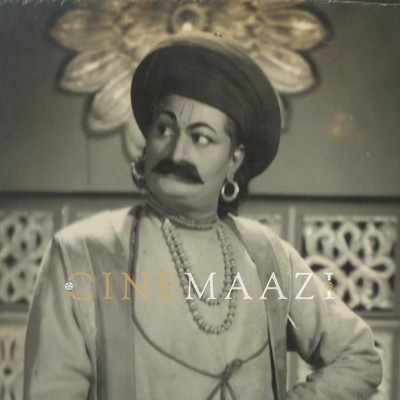Savak B Vacha
Subscribe to read full article
This section is for paid subscribers only. Our subscription is only $37/- for one full year.
You get unlimited access to all paid section and features on the website with this subscription.
Not ready for a full subscription?
You can access this article for $2 , and have it saved to your account for one year.
- Primary Cinema: Hindi
- Spouse: Madame Andree
Savak B Vacha is a sound engineer, producer and director who started at Bombay Talkies working on the studio’s films such as Jeevan Naiya (1936), Achhut Kanya (1936), and Bandhan (1940). Later, he became known for films such as Shikari (1946), which he also directed; Mahal (1949), which introduced the Bombay Gothic genre to Hindi cinema; and Yahudi (1958), believed to be a take-off on a 2,000 year old legend about the persecution of Jews. Married to a French makeup artist at Bombay Talkies, known by the pseudonym Madame Andree, he became one of the partners of the new studio Filmistan set up by the faction that broke away from Bombay Talkies, but later returned to Bombay Talkies along with Ashok Kumar, after buying the majority shares from Devika Rani.
Established in 1934, Bombay Talkies’ founder-owners Himanshu Rai and wife Devika Rani had recruited German and British filmmaking talent including Franz Osten and Josef Wirsching. Simultaneously, they also employed Indian technicians to learn the craft from the European experts. Vacha was one of the early recruits, who learned the craft of filmmaking as a sound engineer in the sound department of Bombay Talkies, where he worked on most of the early films. Incidentally, it was here that Ashok Kumar Ganguly also worked under Vacha for some time in the editing department as an assistant, before he became an actor.
Vacha would work on films such as Jeevan Naiya (1936), Achhut Kanya (1936), Bandhan (1940) and Kismet (1943), which was a great success. However, Bombay Talkies was in deep trouble by then, as due to the start of World War I in 1939, the British government had interned the studio’s German technicians. This crippled operations at Bombay Talkies. Owner Rai grew increasingly stressed and his mental health deteriorated. Plagued by mood swings, during one shoot, he lost control and slapped Vacha, the sound recordist, so hard that the latter lost his hearing in one ear.
An overworked Rai had a nervous breakdown and died in 1940. In the period after Rai’s death, a fallout ensued between Rai’s wife and controller of production, Devika Rani, and an opposing faction led by Rai Bahadur Chunnilal, one of the co-founders and the general manager of Bombay Talkies, that included Sashadhar Mukherjee, Ashok Kumar, and Gyan Mukherjee. Vacha was also part of this faction which broke away from Bombay Talkies to form Filmistan studios in 1943, in which he too was a partner. It was the start of his strong association with Ashok Kumar.
Vacha debuted as a director in 1946 with Filmistan Ltd’s social genre film, Shikari starring Ashok Kumar. The film also introduced Kishore Kumar as an actor, and was also the debut film of Paro Devi. It was penned by well-known writer Saadat Hasan Manto.
After Devika Rani married the renowned Russian painter Svetoslav Roerich, left Bombay and bade goodbye to films, Bombay Talkies was in the doldrums. When Ashok Kumar, sentimentally stirred by this news, approached Vacha with the suggestion that they buy up the majority shares in Bombay Talkies, their film alma mater, Vacha enthusiastically welcomed the idea. Thus, they proceeded to buy up the major shares from Devika Rani and left Filmistan, to take over the leadership of Bombay Talkies.
At Bombay Talkies, Vacha and Ashok Kumar shouldered the burden of Rs 28 lakh that had to be paid to the debtors of the public limited company. During the board meetings various malpractices and defalcations came to light. It was to Vacha that Kumar would say, “We are trapped but we must steer through it carefully, we have to make films with low budgets.”
Incidentally, it was Vacha who started calling Kumar ‘Dadamoni’, popularising this affectionate yet respectful moniker for the senior star in the industry. Prior to Vacha, Kumar’s sister Sati Rani, her husband, producer Sashadhar Mukherjee, and Kumar’s own younger brothers Anoop and Kishore would address him by that name. Vacha was not comfortable with calling Kumar by his first name as he previously did when the latter was his lab assistant. While ‘Mr Ganguly’ was too formal, Dadamoni—the term Vacha heard Sati Rani use to address her brother—proved to be the right blend of closeness as well as respect. Vacha’s use of this sobriquet would be adopted by the whole industry.
Along with Kumar, Vacha produced Bombay Talkies’ Mahal (1949), the iconic drama horror mystery about a young lawyer who is involved with a ghostly woman in his new house, where the builder and his fiancée died shortly after it was built. Starring Ashok Kumar, Madhubala and M Kumar, initial critical response to it was mixed but it went on to emerge as one of the biggest hits of the decade as well as the biggest financial success in Bombay Talkies' history. The film also launched Madhubala and playback singer Lata Mangeshkar into super-stardom. The film influenced a number of horror films since its release, and was also listed in the British Film Institute’s list of ‘10 great romantic horror films’. Reportedly, the film's plot had been rejected by Vacha, who was apprehensive that suspense films do not always find a repeat audience. At the time, Bombay Talkies was already suffering financially due to the box office failure of some of its previous films. However, Kumar insisted that the film could become interesting if directed well and appointed Amrohi as the film's director. Kumar also agreed to co-produce the film, bear the losses if any and even star in the film.
In 1952, Vacha produced the romantic drama Tamasha, directed by Phani Majumdar and starring Dev Anand, Meena Kumari and Bipin Gupta. One of the big hits of the year from Bombay Talkies produced along with Ashok Kumar, Tamasha was deemed to have a narrative far ahead of its times, with its action spread over 16 eventful days. It brought Meena Kumari and Dev Anand together for the first time, and her sparkling eyes and impish smile would be in sharp contrast to the image of the tragedienne she would later acquire. The plot revolved around a young heir apparent who is caught in a whirlpool of his own creation, torn between his infatuation with an aspiring actress and his admiration for the girl he hires as his purported love interest.
The epic romantic historical drama Yahudi, which he produced in 1958 for Bombay Films, was directed by Bimal Roy and starred Sohrab Modi, Dilip Kumar and Meena Kumari in a tale about a vengeful Jew who adopts an abducted Roman child, who grows up to unknowingly fall in love with a Roman. Set in the era of the Roman empire over 2000 years ago, it was based on the Parsi-Urdu theatre classic play Yahudi Ki Ladki by Agha Hashar Kashmiri, revolving around the persecution of Jews in the Roman empire. Vacha passed away during its filming. When it was released, the film carried a homage to him with words, “The workers, technicians and artists of Yahudi pay their respectful homage to late Savak B Vacha who died in harness”. Not very well received critically, the film was nevertheless a big hit at the box office despite its alien theme, becoming the third-highest grossing Indian film of 1958.
References
https://timesofindia.indiatimes.com/entertainment/hindi/movie-details/yahudi/movieshow/61324957.cms
https://indiancine.ma/ENC/info
https://learningandcreativity.com/silhouette/dadamoni-playing-god-life-and-times-of-ashok-kumar/
Dadamoni: The life and Times of Ashok Kumar by Nabendu Ghosh










.jpg)



